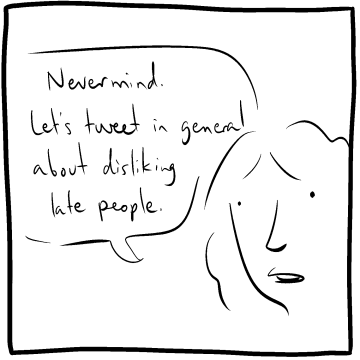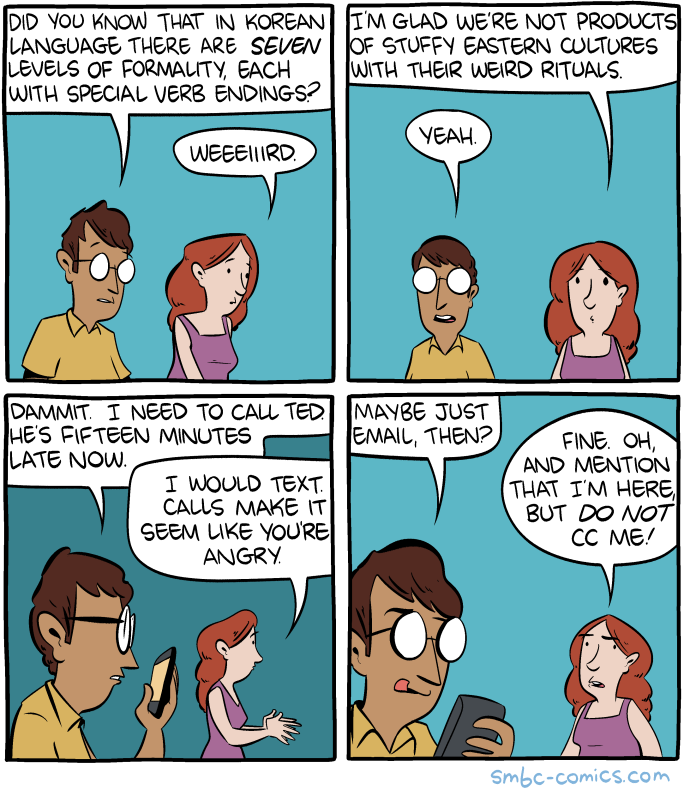Formality
« previous post | next post »
The current SMBC:
Mouseover title: "Finally, someone brave enough to tell the truth about our hypocrisy as to the topic of formality in language."
The aftercomic:

February 6, 2017 @ 8:31 am · Filed by Mark Liberman under Linguistics in the comics
« previous post | next post »
The current SMBC:
Mouseover title: "Finally, someone brave enough to tell the truth about our hypocrisy as to the topic of formality in language."
The aftercomic:

February 6, 2017 @ 8:31 am · Filed by Mark Liberman under Linguistics in the comics
Powered By WordPress

Christian Weisgerber said,
February 6, 2017 @ 9:49 am
"In Korean language" instead of "in the Korean language"?
ohwilleke said,
February 6, 2017 @ 10:23 am
Worth noting that Korean has, in addition to an archaic formality level related to royalty, an extensive additional vocabulary of matters like family relationships that are also archaic and reserved for royalty. For example, there is one word of maternal uncle, and there is a parallel word for royal maternal uncle.
Carl said,
February 6, 2017 @ 10:24 am
I do wish airline attendants would stop using do as pseudo-formality marker in English because I do find it annoying and do want to shoot myself when they won’t stop do-ing it.
Brian said,
February 6, 2017 @ 11:27 am
I would say that there is a qualitative difference between the Korean formality and our range of different forms of communication. It has been well described in a book called Informalization (by Carl Wouters, 2007). Much of what we used to communicate by formal language, we now do by choice of medium or body language. The change is happening everywhere–unevenly. We're further ahead on it than the Koreans.
bobbie said,
February 6, 2017 @ 12:11 pm
Carl, we do want to thank you for flying Dooby Doo Airlines And we do hope you will do us the honor of choosing us for your next flight to Dubai. Buh-bye!
Michael said,
February 6, 2017 @ 12:36 pm
Carl: Would thou prefer to be addressed in the familiar by airline attendants?
nbm said,
February 6, 2017 @ 1:16 pm
"Wouldst," surely, Michael? #proofreadingintheRenaissance
leoboiko said,
February 6, 2017 @ 1:56 pm
@Carl: Hard to fight that. There's an universal perception that longer utterances are more formal/politer.
As for Korean vs. English formality, I think this is the time to cite Jakobson: "Languages differ essentially in what they must convey and not in what they may convey."
Chandra said,
February 6, 2017 @ 2:58 pm
The behaviour in the aftercomic is known as "subtweeting", which I find to be an interesting neologism as it's the only instance I can think of where the prefix "sub-" seems to mean something like "indirect" rather than "under".
Vince Edgar said,
February 6, 2017 @ 4:46 pm
@Chandra: Surely, "subtweeting" is a reference to conveying subtext information in the Twitter environment.
David Marjanović said,
February 6, 2017 @ 5:13 pm
Subtweeting is like vaguebooking, then?
A said,
February 6, 2017 @ 7:24 pm
My understanding is that "subtweet" is short for "subliminal tweet."
Chandra said,
February 6, 2017 @ 7:42 pm
@Vince Edgar – You lend more erudition to the average Twitter user than I.
@David Marjanović – More or less, but vaguebooking isn't necessarily (in)directed at a specific person.
Marja Erwin said,
February 6, 2017 @ 7:49 pm
"Much of what we used to communicate by formal language, we now do by choice of medium or body language."
Reliance on "body language," "facial expressions," "safety signals," etc. locks out people who can't read these things, or can be incapacitated by them. As social norms, institutional norms, state policies, etc. reliance on "body language" and "facial expressions" locks out many disabled and/or neurodivergent people, and reliance on various unsafe "safety signals" endangers, blinds, disorients, triggers incapacitating pain in, triggers migraines in, triggers seizures in, or triggers vomiting in some of us.
SB said,
February 6, 2017 @ 11:53 pm
In the final panel, is the lettering hedging its bets on whether "never[ ]mind" is one word or two?
Jerry Friedman said,
February 7, 2017 @ 12:11 am
Marja Erwin: What kind of safety signals endanger, blind, etc., some people? Are you talking about such things as flashing lights?
Chas Belov said,
February 7, 2017 @ 12:58 am
I'd only known about three politeness levels in Korean. I see by the Wikipedia article on Korean speech levels, the three I was aware of appear to be:
Hasipsio-che ("hamnida" (합니다))
Haeyo-che ("haseyo" (하세요))
and likely Haera-che ("handa (한다)")
I used this model for my play My Visit to America, and wound up adding a fourth, for which I don't see an equivalent, where the second person singular is essentially a title for someone you don't know a title for, e.g., "the stranger."
Vilinthril said,
February 7, 2017 @ 6:09 am
Interesting detail regarding “subtweeting”: In Austrian Twitter (so, in Austrian German), the practice is exclusively referred to as “nonmentioning” (which I think is a much clearer term for it). AFAIK, in Germany, “subtweet” is used.
Marja Erwin said,
February 7, 2017 @ 1:25 pm
"What kind of safety signals endanger, blind, etc., some people? Are you talking about such things as flashing lights?"
Yes.
In my case, backup beaters/painhammers and sirens incapacitate through sheer pain. I wear 63 nrr of protection whan going outside, but I can't get properly-fitting protection, and it isn't enough.
Also in my case, strobe lights, police car lights, hazard lights, turn signals, and crosswalk signals incapacitate through blinding and disorientation/unbalancing. If I'm hit by flashing lights from multiple directions, such as turn signals at an intersection, I sometimes end up stumbling into the street. And some of these trigger my migraines and my vomiting, though luckily I don't seem to get seizures too. I wear sunglasses, but they aren't much. I also use blackout curtains, which protect against daytime strobings, but not nighttime strobings.
Jongseong Park said,
February 8, 2017 @ 12:12 pm
@Chas Belov, you can get by knowing just those three paradigms: 합쇼체 hapsyoche (which is the name more Koreans would be familiar with than the more unwieldy 하십시오체 hasipsioche), 해요체 haeyoche, and 해라체 haerache. Strictly speaking, 해체 haeche is separate from the latter, and is very common in everyday familiar speech, so you should know these two. For the others, just a passive understanding will suffice for most situations.
In practice, Korean speakers often use a mix of different speech levels to strike the desired level of formality. For instance, one could use 70% haeyoche (polite informal) and 30% hapsyoche (polite formal) to make it informal but not that informal. Of course, Korean speakers hardly ever think about this consciously, but it's something that learners of Korean can struggle to imitate convincingly. One stereotype of KSL speech is the unwaveringly consistent use of haeyoche, with the effect that every sentence seems to end with -요. Many learners of Korean start by learning haeyoche (using only hapsyoche would sound overly formal for everyday speech), so that's understandably what they're most comfortable using.
Michael said,
February 9, 2017 @ 11:59 am
@nbm: My people are Quakers, and we were saying "would thou" until just a few generations ago. The renaissance has nothing to do with it.